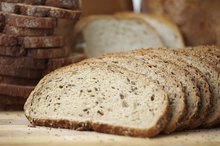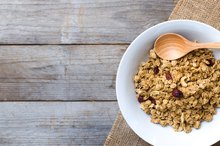What does fact checked mean?
At Healthfully, we strive to deliver objective content that is accurate and up-to-date. Our team periodically reviews articles in order to ensure content quality. The sources cited below consist of evidence from peer-reviewed journals, prominent medical organizations, academic associations, and government data.
The information contained on this site is for informational purposes only, and should not be used as a substitute for the advice of a professional health care provider. Please check with the appropriate physician regarding health questions and concerns. Although we strive to deliver accurate and up-to-date information, no guarantee to that effect is made.
Which Foods Are the Highest in Starch to Help Put on Weight?
Starchy foods have a reputation as weight-gainers, thanks in part to the low-carb diet craze at the beginning of the 21st century. While these foods may help you gain a few pounds, it's not the starch -- a type of carbohydrate -- that causes the weight gain but the overall calories. Use starchy foods to boost your calorie intake, but make sure you're also getting enough calories -- from carbs, protein and fat -- to reach your weight-gain goals.
How to Gain Weight
Your friends may be envious, but you know that gaining weight isn't as easy as it sounds. Eating more calories to gain may be as hard for you as it is for those who need to eat fewer calories to lose. To gain 1/2 to 1 pound a week you need to eat an additional 250 to 500 calories a day. For example, if you currently eat 2,200 calories a day to maintain weight, eating 2,450 to 2,700 calories may help you gain. If you're very active or have a fast metabolism, however, you may need to eat even more to gain weight.
- Your friends may be envious, but you know that gaining weight isn't as easy as it sounds.
- Eating more calories to gain may be as hard for you as it is for those who need to eat fewer calories to lose.
High-Starch Foods
Can a Low-Carb Diet Cause Low Blood Pressure?
Learn More
Starchy foods can serve as a source of extra calories to help you gain weight. Choose high-calorie, nutrient-rich starches to get fiber, B vitamins and iron, along with the extra calories. Healthy options include:
- dense whole-grain bread
- oats
- brown rice
- quinoa
- beans
- potatoes
- whole-wheat pasta
Maintaining a Balanced Diet
While starches are an important part of your diet, it's not the only food group you should focus on when you want to gain weight. Healthy weight gain requires a balanced intake from all the groups, including fruits, vegetables, protein and dairy 2. Add dried fruit and nuts to your hot cereal at breakfast. Top lunchtime sandwiches with slices of avocado or melt cheese on your baked potatoes. Include higher-calorie proteins, such as:
- peas
- winter squash
- at dinner
- While starches are an important part of your diet, it's not the only food group you should focus on when you want to gain weight.
- Healthy weight gain requires a balanced intake from all the groups, including fruits, vegetables, protein and dairy 2.
Sample Meal Plan
Wheat Chex Cereal Nutrition Information
Learn More
Plan on eating about five times a day on your weight-gain meal plan. Include a variety of food groups at each meal, along with your high-calorie starches, for balance and nutrition.
A cheese omelet served with sauteed diced sweet potatoes and onions and a glass of 100-percent orange juice makes a good breakfast meal. For a midmorning snack, whole-wheat bread with peanut butter and low-fat milk is high in calories and nutrition.
At lunch, you might enjoy a tuna sandwich made with albacore tuna, mayonnaise and diced celery stuffed into whole-wheat pita with a container of low-fat yogurt and an orange. Whole-grain ready-to-eat cereal with low-fat milk and a banana makes a good afternoon snack.
Finish the day with a corn tortilla filled with pureed black beans served with brown rice, corn and mixed greens topped with salad dressing. Depending on portion size, this sample menu may have as much as 2,500 calories.
- Plan on eating about five times a day on your weight-gain meal plan.
- A cheese omelet served with sauteed diced sweet potatoes and onions and a glass of 100-percent orange juice makes a good breakfast meal.
Related Articles
References
- Academy of Nutrition and Dietetics: Healthy Weight Gain
- Healthy ways to gain weight if you're underweight. familydoctor.org. American Academy of Family Physicians
- U.S. Department of Health and Human Services and U.S. Department of Agriculture. 2015 – 2020 Dietary Guidelines for Americans. 8th Edition.
- US Office of Disease Prevention and Health Promotion. "2015–2020 Dietary Guidelines for Americans."
Writer Bio
Jill Corleone is a registered dietitian and health coach who has been writing and lecturing on diet and health for more than 15 years. Her work has been featured on the Huffington Post, Diabetes Self-Management and in the book "Noninvasive Mechanical Ventilation," edited by John R. Bach, M.D. Corleone holds a Bachelor of Science in nutrition.







